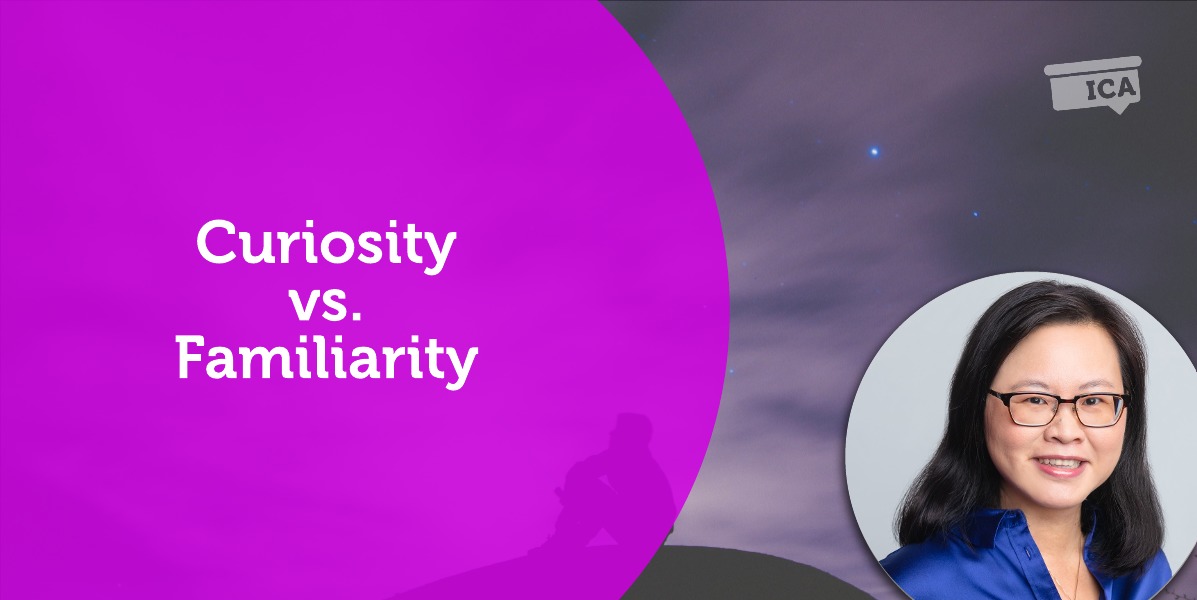
A Coaching Power Tool Created by Jenny Toh
(Christian Life Coach, SINGAPORE)
 Remember when you were a child. What was your earliest childhood memory? Do you recall tasting vanilla ice cream for the first time? The tingling sensation you felt in your tongue, the tinge of pain in your head if you ate the ice cream too quickly, and the gooey yucky feeling on your little fingers when the ice cream melted.
Remember when you were a child. What was your earliest childhood memory? Do you recall tasting vanilla ice cream for the first time? The tingling sensation you felt in your tongue, the tinge of pain in your head if you ate the ice cream too quickly, and the gooey yucky feeling on your little fingers when the ice cream melted.
Were you disappointed that you finished it so quickly? Or did you realize that vanilla ice cream is not something you will ever want to eat again?
What do you feel now when you eat a vanilla ice cream? When was the last time you ate ice cream? Was it so long ago that you cannot even remember?
If you had one recently, can you recall its exact taste? What about the feeling you had when you ate it? Did you have time to savor it? “What’s to savor?”, you ask, “It’s just vanilla ice cream.”
Is vanilla ice cream too familiar to you now? Have you lost the curiosity and awe of a simple vanilla ice cream?
Curiosity
The Oxford dictionary defines curiosity as a strong desire to know or learn something. Taking the example of the vanilla ice cream, like most adults, we are no longer interested in finding out more about the vanilla ice cream. At most, we appreciate it as a nice cool relief on a warm summer’s day or an indulgence after a long work week. As a child, you are more likely to ask your parents various questions about ice cream. How do they make ice cream? Why is it called vanilla? Why does it go mushy so quickly? What other shapes can a vanilla ice cream take? Why can’t it stay cold for longer? Can I keep the ice cream in a bag? The possibilities of questions about vanilla ice cream are endless for a child. For an adult, unless you are a researcher in an ice cream production organization, you would probably not even ask a single question!
Familiarity
You are just too familiar with vanilla ice cream. The Oxford dictionary defines familiarity as a close acquaintance with or knowledge of something. The following examples highlight some of the aspects of familiarity in our lives. Sarah and Maryanne are so familiar with each other that they still call each other by their childhood nicknames even though they are now married and have children. Aishah feels at ease and safe in the familiar surroundings of her parents’ home. Branda goes into “auto-pilot” mode when she drives to work as she takes the same route that she has driven on for the past 7 years. Benjamin cannot imagine working for any other organization apart from Organisation X as he has been an employee there for 15 years. He is familiar with the organizational culture, people, and processes.
Familiarity gives us a sense of security and comfort. It also makes us “like” the situations, people, and circumstances that we are familiar with. We have a tendency not to put in the effort to understand and connect with the people whom we are familiar with. These relationships are easy and convenient. As for familiar situations and circumstances, we feel safe, relaxed, and comfortable. We do not have the desire to change, improve, or try new things as it just takes too much effort to break away from the familiarity.
What happens when there is too much familiarity? There is a saying, “familiarity breeds contempt”. The essence of this saying is that the longer you know someone or are in a situation, you are more likely to learn about the negative aspects of that person or situation over time.
Let’s revisit the earlier examples. Sarah and Maryanne have known each other since they were 7 years old. Maryanne still jokingly calls Sarah “Tubby” and a scatterbrain because Sarah was chubby when she was young and had a tendency to forget things. Sarah secretly does not like those names but cannot bring herself to communicate her dislike to Maryanne. As a result, Sarah finds it awkward when around Maryanne and now look for ways to distance herself from Maryanne.
Aishah lives with her parents because she is very comfortable and does not need to pay rent. There are always nice home-cooked meals waiting for her when she returns home from work. However, Aishah has a growing resentment towards her mother because her mother still treats her like a child. She always wants to know Aishah’s whereabouts and comments on her attire, her diet, and her habits.
As a result of construction work to build apartment blocks along Branda’s usual route to work, some of the roads are closed and diverted to alternative roads. Branda is frustrated as this entails a long journey to her office. She will also have to start her day earlier to reach her office on time. She often ends up in the office feeling angry and exhausted.
Although Benjamin feels a sense of dissatisfaction and a lack of fulfillment in his life, he is not willing to sacrifice the comfort of familiarity to venture out into the unknown to look for new prospects of employment. Instead, he often feels demotivated and complacent. He wonders if this is all that there is in his life.
Sounds familiar?
Let us assume that Sarah, Aishah, Branda, and Benjamin are your new coaching clients. How can you use curiosity as a tool to create awareness and to support them in their respective coaching journeys with you?

If there’s one thing I’ve learned in my life, it’s that curiosity might kill cats, but it doesn’t kill people. Tracy Morgan, American actor, and comedian
…and…
That which does not kill us makes us stronger. Friedrich Nietzsche, German philosopher
In Sarah’s situation, you, as a coach, can start exploring the reasons behind her reluctance to communicate openly with Maryanne although they have been friends since childhood. You can explore Sarah’s thoughts and feelings about her friendship with Maryanne by asking the following questions:
These questions will help Sarah reflect on the value she places on her friendship with Maryanne and address her current feelings about this friendship. Sarah’s familiarity with Maryanne has resulted in her acceptance that this is the way their friendship works. When she explores the answers to these questions, she will be curious as to why she is tolerating Maryanne’s actions and hopefully propel her to take positive steps to redefine their friendship for the better.
The same curiosity approach can be applied to Aishah’s situation. You, as the coach, can explore the reasons behind her resentment towards her mother. By staying curious, you do not assume that the only reason that Aishah is staying with her parents is due to financial reasons. You can explore the dynamics of her relationship with her mother, her current job situation, her underlying beliefs about her finances, and her plans for the future. Aishah may realize that she is not making any changes now because she is fearful of the uncertainty of moving out and staying on her own. As her coach, you can support her in a visualization exercise if she is comfortable to do so, where she is living in her apartment and ask her about the insights that she has gained from the exercise. Perhaps, her goal in her coaching journey is not to be independent but to address deep-rooted issues in her relationship with her mother. The primary support you can give Aishah as her coach is to stay curious and follow her through her exploration without any judgment or preconceived ideas of her situation.
As for Branda, you can support her by asking her questions that will make her view this change in her driving route to work in a new light. For example,
Branda’s exploration of the answers to these questions is likely to take away the drudgery of a long journey to work and brighten up her weekday mornings.
Benjamin may be in a situation where he feels too safe and comfortable to make changes in his life despite the feeling of emptiness and lack of purpose. As his coach, you would not immediately ask him to consider a change of employment as that option may not be the right one for him. Instead, support him through his exploration of the aspects of his current job that he enjoys and the ways he can control to improve the things he does not enjoy at work. It may be a change in perspective or mindset. It may be trying out new ways to tackle a familiar task.
However, if through his coaching journey, he discovers that he wants a change of employment or even to start a new venture on his own, you will encourage and yet challenge him to be comfortable with the uncertainties of a new job or a new business. Once Benjamin becomes comfortable with the uncomfortable, he will find it much easier to move forward in the decisions that he makes for his future.
“Uncertainty is a good compass point for knowing when you are on a good pathway; uncertainty is not always a signal of the negative. When we allow ourselves to be curious, we quickly come face to face with confusion and uncertainty. People tend to initially resist uncomfortable and unknown feelings—the model of their world is challenged—the model of their world is constantly re-evaluated. This model is never correct and it’s supposed to be that way and not something to scare you. This is hard to internalize as our natural instincts like to go to a state of safeness and certainty.”3
“To me, it’s almost a sin to not satisfy curiosity and give it the freedom to grow. Serving your curiosity brings continuous happiness, opportunities, and adventures into our lives. Curiosity helps open our eyes to how empowered we’ve been since birth to literally choose our own adventure. Curiosity leads to awareness and that awareness exposes the 10 billion paths you can take. Whatever we think we must do, say, pursue, or be, is bounded mostly by our thoughts. Curiosity with low micro-defeatist thoughts helps reveal this truth and make life’s experiences, both personally and professionally, infinite and richer. Keep curiosity constant; reduce the micro-defeatist barriers creating inaction. Commit to trying things differently for a couple of weeks and watch how things unfold differently.”4
Todd Kashdan, a clinical associate psychologist and professor of psychology at George Mason University5, suggested the following ways to develop and expand our curiosity capacity:
We can choose to practice these suggestions daily to improve our skills as coaches or use them to support our clients. A coach has a strong coaching presence when he/she “dances” at the moment with the client, creating a space that is open and flexible. The coach exhibits curiosity, always intending to learn more about the client. It is in this safe space that allows for exploration with a curiosity that will greatly enrich the client’s coaching journey towards his/her goals in life.
Enjoy every step you take. If you’re curious, there is always something new to be discovered in the backdrop of your daily life. Roy T. Bennett, author of The Light in the Heart.
References:
Image 1 – taken from Pixabay
Image 2 – taken from Pixabay
Curiosity: The One Superpower We Don’t Use Enough, And How To Use It by Lawton Ursrey, published in Forbes on 20 June 2014.
Quote by Andrew Smart, author of Autopilot: The Art and Science of Doing Nothing.
Curiosity: The One Superpower We Don’t Use Enough, And How To Use It by Lawton Ursrey, published in Forbes on 20 June 2014.
The Power of Curiosity by Todd Kashdan, published in Experience Life in May 2010.